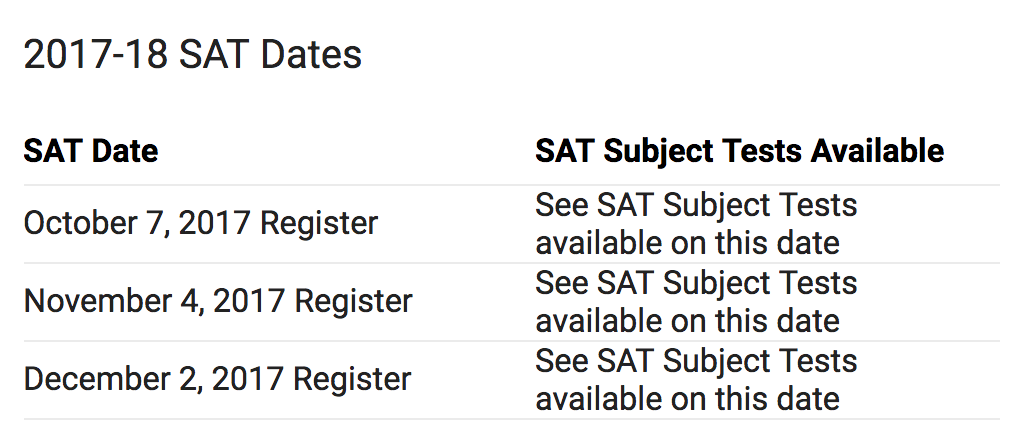Given that the content on the SAT® is so complicated and the college application timeline starts so early, you should aim to take your first SAT® in the fall of junior year, at the latest. Here are the dates for the SAT® test this fall.

Let’s say you took the SAT® in November and scored 700 on both sections. Let’s imagine that your GPA is 3.9 and your reach school is Brown.
According to the INTERNET ( the information hydrant that knows everything) Brown’s acceptance SAT® score was 1490.

If you want to give your reach school a try - having taken your SAT® in the fall of your junior year gives you time to retake the SAT® in spring if you want a higher score. If you take the SAT® and score 1400 and your reach school requires 1490, you can retake the SAT® and try to score 1490 or above.
Here is how long it usually takes:
- 0-50 SAT® Composite Point Improvement: 10 hours
- 50-100 Point Improvement: 20 hours
- 100-200 Point Improvement: 40 hours
- 200-300 Point Improvement: 80 hours
- 300-500 Point Improvement: 150 hours+
Then if you score well, senior year will be freed up for your college applications. Also, aiming for junior fall means your SAT® studying won’t compete with AP or IB exams. Did you notice that the average GPA was 4.05?;-) You need your full focus and time to achieve those extra points.
Each student has to decide between a more intense study schedule (like 10 hours a week for two months) or a more gradual one (four hours a week for five months). Either method can work and help you make huge score increases, so choosing a plan will just depend on your schedule and study style.
Working backwards from junior fall, it’s good to start studying at some point during sophomore year for a longer, less intense plan or the summer after sophomore year for a more intense plan.
Taking the PSAT® (Practice SAT® ) or PSAT® 10 as a sophomore is a great way to get introduced to the test in a completely no-pressure situation – you aren’t qualified for the National Merit competition until junior year, so you can just get an introduction to the test and get a sense of where you stand with your current skills.
If your school doesn’t offer the PSAT® or it's too late to sign up, you can also take a free SAT® practice test online. Just remember to time yourself carefully to simulate actual test conditions!
Once you know your base score based on the PSAT® or an online practice test, figure out your target score. Your target score will be based on colleges you want to go to.
If you're looking for a small improvement, like 50 points, you can do this by optimizing your testing strategy and possibly even just by retaking the test. But for serious improvements, 200 points and above, you likely still need to learn a lot of fundamental content. Little tricks and strategies won't be enough to raise your score - you will need to learn actual material and attack your test-taking weaknesses.
In general, I recommend that students study for at least 40 hours for the SAT® before they take the test.
40 hours might sound like a lot. But here’s one way to think about it - we’ll be splitting it up over the time you have until your test date. If you have 8 weeks, we just need to study 5 hours every week.
In fact, you’ve probably spent way more than 40 hours on your other activities - sports, volunteering, schoolwork, texting or messaging friends, watching TV. I read some statistic that said that we spend one hour each day - simply looking for things. Even if you just spend 2 hours a week on one of these things, over 20 weeks you’ll have accumulated 40 hours.
This means that every hour you spend on SAT® prep will do more to get you into college than spending it on anything else because, if you’re like most students, you haven’t yet seriously dedicated enough time to SAT® prep.
Remember your score target? You can reach that if you put in the work. The flipside is, if you don’t put in the work, you’ll be unlikely to hit that goal. Given how important the SAT® is to getting admitted to college - it can be anywhere from 20 to 50% of the college decision - it’s crazy NOT to put in enough time to study.
Of course, if you can study more than 40 hours - bringing it up to 80, 100+ hours - that would be fantastic, and your hard work will pay off with meeting your target SAT® score.
No matter how you dice it, 40 hours seems like a lot. It seems like there’s so much to study and so much work to do that it’s daunting. It’s like looking up at a mountain before your hike. The problem with this thinking is that you end up putting off the work and procrastinating instead of taking the steps to study.
That’s why it’s important to break it up into chunks in the time leading up to your test. Specifically:
I highly recommend that you schedule at least 5 hours of studying a week.
By breaking up your study plan week by week, you’ll be far more likely to meet your study goals. You’ll also build momentum from week to week.
But there’s another problem with this. It’s too vague. It’s too tempting to just say, “well, I’m going to study 5 hours a week sometime.” Before you know it, it’s Sunday and you’re going to sleep without putting in the time to study.
So I want you do one further thing:
Every week, I want you to pre-schedule your study sessions. Name specific days and times, like Thursday 7-9PM, Sunday 1-3PM.
Just like scheduling sports practice, rehearsals, or meeting up with friends, I want you to schedule the exact times you’re going to study. I want you to block out parts of your week mentally and dedicate that to SAT® prep.
I’ve done this with hundreds of students in the past. I’ve found that it consistently encourages students like you to study up to 5 times more.
There’s a special case in scheduling: practice tests.
If you have a practice test this week, schedule a block of 4 hours so you can do the test and review it afterward. Try to add it to the 5 hours of lesson work if you can.
Overall, you know studying is good for you. The urge to procrastinate that you feel comes from fear that studying will be painful or pointless.
I guarantee you, studying is nowhere near as bad as you think it is. Every time you study, you’ll make progress. This might not be obvious every single minute. But when you take a practice test after just a few hours of studying, you’ll see how you improve in understanding what the SAT® is testing, and how you can beat it.
Finally, for the time that you spend studying, I want you to take it seriously. Study in the right environment. Close Facebook and put your phone on silent. Don’t answer your texts. Be in a quiet area - no TV, radio, or distracting music (music that you can concentrate with is OK). Be in a place where people won’t interrupt you. Even though we’re online, it’s for your convenience, not so you can browse Facebook.
If you commit to putting in the time every week all the way up to your test, you’ll be in amazing shape for the test date.
If you want more support and have more questions about your SAT® - give me a call.
Click here to schedule an appointment.

